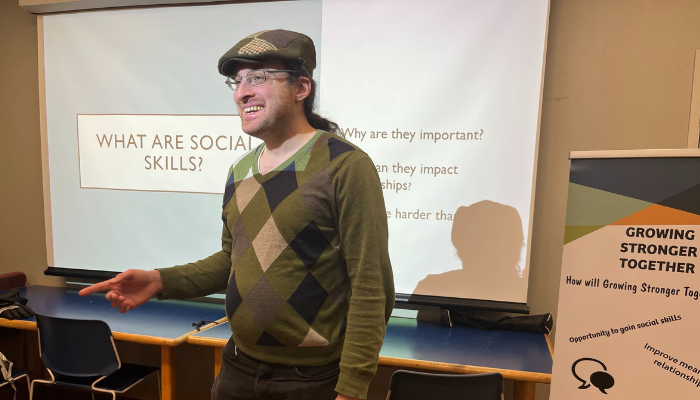As a peer support program facilitator, Alexander shares his own lived experience to strengthen trust and connection with Growing Stronger Together participants.
For years, Alexander’s thoughts deceived him. A long psychotic episode in his late teens skewed his perception of reality and strained his relationships. Determined to trust himself again, he knew regaining social skills would be an essential part of recovery.
Then he found the Growing Stronger Together (GST) peer support group, a program funded by the Mental Health Foundation of Nova Scotia and operated through Connections Dartmouth, a recovery-focused outpatient service from Nova Scotia’s Mental Health and Addictions Program.
Week by week, GST sessions helped Alexander grow more comfortable with himself and in interactions with others. The next year he returned to GST — not as a participant, but as a facilitator. With a new passion for peer support, he’s now helping others navigate emotional recovery from severe symptoms of mental illness.
Finding wellness when symptoms fade
“[A psychotic episode] is like viewing the world through a very different lens. When you’re interpreting what others say, it all gets twisted up into a different context,” recalls Alexander. “One of the more isolating aspects of that period of my life was not being able to communicate with other people.”
Under the care of Early Psychosis Intervention Nova Scotia (EPINS), his acute symptoms — hallucinations and delusions — gradually subsided with treatment. As he processed what happened, he couldn’t help but second-guess his state of mind.
You can help Nova Scotians Heal & Recover
Your donation will fund life changing programs that help people living with mental illness find community, connection, strength, and hope in recovery.
“The further I got into treatment, the more uncertain I was because I would look back at moments and think ‘wow, I really twisted that around’,” he says. “I had fewer symptoms, but I felt like [distorted thinking] became habit.”
After a psychotic episode, many people struggle with feelings of doubt and distrust, a reality that can be emotionally taxing and isolating. Some find they’ve lost social skills and confidence, putting them at risk of withdrawing from social situations. But research has shown that social connection plays a key role in recovery and reducing setbacks for people living with severe mental illness.
“I realized that wellness isn’t just about no longer hallucinating or having delusions,” says Alexander.
Strength in community
Alexander was referred to GST, where adults living with mental illness gather with facilitators weekly to share experiences, support one another, and work on social skills. The program includes outings so participants can practice what they’re learning while ordering a coffee or gearing up for a bowling match.
During a session on body language, Alexander realized that something as simple as standing near people while in conversation, rather than lingering at the back of a room, had been lost on him after his episode.
“To be frank, if you spend time talking to people in your head who aren’t really there, proper orientation doesn’t matter,” he explains. “Facing away from someone during a conversation — I didn’t see anything wrong with that because it had been normalized.”
Recreation therapist Heather Baker and registered nurse Elizabeth Cleary worked with Joshua Bordage, a recreation therapy intern at the time, to develop GST in 2022. Designed to help people reconnect with their communities, the program focuses on rebuilding daily life skills after experiencing disorienting and isolating symptoms of mental illness.
“I was among peers and putting myself out there was important to do,” says Alexander. “Even after the first session, I felt like I started taking more initiative in my life.”
Connecting through shared experience
“When we talk about mental illness, we focus a lot on treatment,” Alexander said when welcoming the latest cohort of GST members earlier this year. “My own experience with mental health care showed me there’s only so much that can be done from a clinical perspective. Social isolation — we need to address that too.”
Alexander, who’s been facilitating GST for two years now, approaches each session with a balance of structured learning and authentic, open discussion.
“I think the strength of the program is how much each participant brings to our discussions,” he says. “The real meat and potatoes come when we hear what everyone has to say.”
Life beyond illness
Mental illness is complex and affects everyone differently, but it doesn’t erase a person’s value or purpose.
“It’s only my experience, but I think social connection after treatment lifts one of the biggest barriers to having a healthy, integrated life — isolation,” says Alexander.
Through GST, Alexander regained self-trust, confidence, and discovered a passion for helping others. Today, he works with Affirmative Ventures, enjoys meeting new people through martial arts and ballroom dancing lessons, and continues to support others on their road to recovery.
Alexander’s story is proof that recovery is possible — and that healing goes beyond managing symptoms. It’s about connecting with others, building a community of support, and discovering new possibilities, even in the face of illness.


